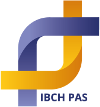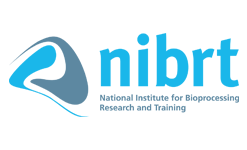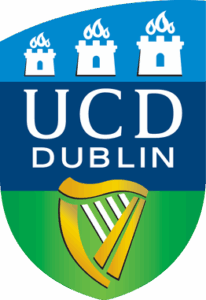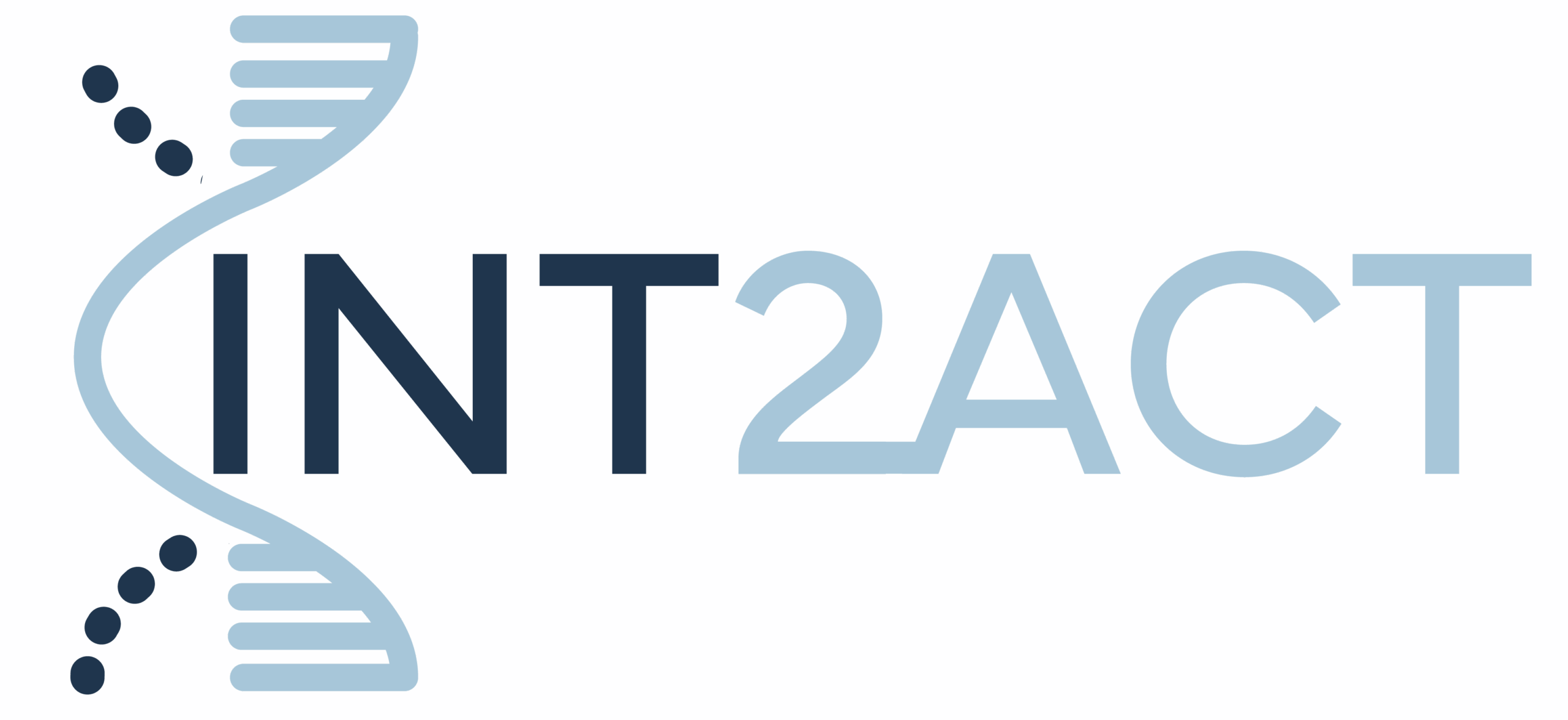Open positions
INT2ACT is seeking talented and motivated candidates with the skills, knowledge, and enthusiasm to help the network achieve significant research breakthroughs. Doctoral Candidates (DCs) will enrol in PhD degree programmes and be employed for 36 months in a network comprising 11 beneficiaries and 10 associated partners from 8 European countries, Israel, and China.
DC1: An integrated multi-omic and spectroscopic approach to the identification of novel blood CAR-T biomarkers by ML analyses

Host institution: IIS Biogipuzkoa Health Research Centre, Donostia-San Sebastián, Spain
Supervisor: Prof. Charles Lawrie
Co-Supervisors: Dr. María Armesto, Biodonostia Research Institute (Academic); Dr Carlo Vascotto, University of Udine (Academic); Dr Marc Weber, Flomics Biotech SL (Industrial)
Secondments: This project is carried out in collaboration with the following groups and visits to their laboratories are expected during the project:
• Prof. Lei Zhang, Sino-Swiss Institute for Advanced Technology (SSIAT), Shanghai University, China
• Dr. Marc Weber, Flomics Biotech SL, Barcelona, Spain
DC2: Identification and implementation of novel cell-free RNA-based biomarker types for early cancer detection using liquid biopsy
In this project, we will identify and implement novel cfRNA-based biomarkers in blood plasma for the early detection of cancer. Using optimised protocols for RNA sequencing and an in-house dataset of ~1,100 samples from 5 types of cancer patients and healthy donors, we will explore mitochondrial-derived RNAs, circular RNAs, single nucleotide variants and novel transcripts. Bioinformatics pipelines and advanced machine learning models will be developed to distinguish cancer patients from healthy donors with high accuracy. Read the full project description and specific requirements here.
Host institution: Flomics Biotech SL, Barcelona, Spain
Supervisor: Dr. Marc Weber
Co-Supervisors: Dr. Phil Sanders, Flomics Biotech SL (Industrial); Dr. Tomas Marques, Dr. Esther Lizano, Fundacio de Pais Vasco (Academic); Dr. Carlo Vascotto, University of Udine (Academic); Prof. Barbara Uszczynska-Ratajczak, Institute of Bioorganic Chemistry of the Polish Academy of Science (Academic)
Secondments: This project is carried out in strong collaboration with the following groups, and visits to their laboratories are expected during the project:
DC3: Nanoparticle detection of nucleic acids from pathogens

Host institution: IIS Biogipuzkoa Health Research Centre, Donostia-San Sebastián, Spain
Supervisor: Prof. Charles Lawrie
Co-Supervisors: Dr. María Armesto, Biodonostia Research Institute (Academic); Dr. Carlo Vascotto, University of Udine (Academic); Dr. Thomas Frischmuth, baseclick GmbH (Industrial)
Secondments: This project is carried out in strong collaboration with the following groups and visits to their laboratories are expected during the project:
Prof. Lei Zhang, Sino-Swiss Institute for Advanced Technology (SSIAT), Shanghai University, China
DC4: Advanced protocols for Native RNA sequencing by ONT

Host institution: Istituto Italiano di Tecnologia, Center for Genomic Sciences, Milan, Italy
Supervisor: Dr. Francesco Nicassio
Co-Supervisors: Prof. Winston Timp, Johns Hopkins University (Academic); Dr. Federico Forneris, Instituto Universitatrio di Studi Superiori di Pavia (Academic); Dr. Logan Mulroney, (NIH ), (Academic); Dr. Thomas Frischmuth, baseclick GmbH (Industrial).
Secondments: This project is carried out in strong collaboration with the following groups, and visits to their laboratories are expected during the project:
- Dr. Thomas Frischmuth, baseclick GmbH, Germany;
- Prof. Winston Timp, Johns Hopkins University, USA;
- Dr. Marc Weber, Flomics Biotech SL, Spain.
DC5: Development of click chemistry-enabled NGS library technology for direct RNA profiling
In this project, we will exploit click-chemistry-mediated ligation to generate libraries for direct RNA sequencing on the Oxford Nanopore platform, with a focus on non-coding RNA (ncRNA). We will optimise the incorporation of modified nucleotides, establish efficient click reactions between RNA and sequencing adaptors, and screen adaptor designs for best performance. The overall aim is to streamline RNA library preparation, reduce input material requirements, and expand coverage of the non-coding transcriptome, including direct analysis of RNA modifications. Read the full project description and specific requirements here.
Host institution: baseclick GmbH, Neuried, Germany
Supervisor: Dr. Thomas Frischmuth
Co-Supervisors: Dr. Stefan Wiedemann, baseclick GmbH (Industrial).
Secondments: This project is carried out in strong collaboration with the following groups, and visits to their laboratories are expected during the project:
DC6: Advancing single-molecule RNA sequencing and structure analysis for custom genomic regions

Host institution: Institute of Bioorganic Chemistry, Polish Academy of Sciences, Poland
Supervisor: Prof. Barbara Uszczynska-Ratajczak
Co-Supervisors: Dr. Rory Johnson, University College Dublin (Academic); Dr. Joao Curado, Flomics Biotech SL (Industrial)
Secondments: This project is carried out in strong collaboration with the following groups, and visits to their laboratories are expected during the project. A willingness to travel and spend time abroad is therefore essential:
- Rory Johnson, University College Dublin, Ireland;
- Joao Curado, Flomics Biotech SL, Spain.
DC7: Dynamic combinatorial oligonucleotides libraries
In this project, we will extend dynamic combinatorial chemistry to oligonucleotides, creating libraries that can adapt and respond to templating molecules. By exploiting the reversibility of selected chemical reactions, we will generate large and diverse dynamic combinatorial libraries of oligonucleotides (DCL ONs) capable of amplifying the best binders in the presence of a target template. The project will involve the synthesis of tailored nucleoside analogues using advanced organic chemistry, alongside the development of analytical tools such as mass spectrometry and spectroscopy to monitor system behaviour. Applications will be pursued in sequencing, sensing, and aptamer formation, providing a foundation for novel biotechnological systems. Read full project description and eligibility criteria here.
Host institution: University of Southampton, School of Chemistry and Chemical Engineering, Southampton, UK.
Supervisor: Prof. Eugen Stulz
Co-Supervisors: Prof. Barbara Uszczynska-Ratajczak, Institute of Bioorganic Chemistry, Polish Academy of Sciences (Academic); Dr. Thomas Frischmuth, baseclick GmbH (Industrial).
Secondments: This project is carried out in strong collaboration with the following groups, and visits to their laboratories are expected during the project. A willingness to travel and spend time abroad is therefore essential:
DC8: Investigation of the role of CyPD in the mtRNA metabolism

Host institution: University of Udine, Department of Medicine, Udine, Italy
Supervisor: Dr. Carlo Vascotto
Co-Supervisors: Prof. Barbara Uszczynska-Ratajczak, Institute of Bioorganic Chemistry, Polish Academy of Sciences (Academic); Dr. Alexander Jackson, Nanovery Ltd. (Industrial).
Secondments: This project is carried out in strong collaboration with the following groups, and visits to their laboratories are expected during the project:
DC9: Optimisation of a protocol and creation of a commercial kit for the quantification of mitochondrial DNA oxidative lesions

Host institution: University of Udine, Department of Medicine, Udine, Italy
Supervisor: Dr. Carlo Vascotto
Co-Supervisors: Prof. Lena Burbulla, Ludwig-Maximilians University of Munich (Academic); Dr. Thomas Frischmuth, baseclick GmbH (Industrial); Roma Galloway, Nanovery Ltd. (Industrial).
Secondments: This project is carried out in strong collaboration with the following groups, and visits to their laboratories are expected during the project:
DC10: Tools to target the epitranscriptomic modifications on transgenic mRNA

Host institution: National Institute for Bioprocessing Research and Training, Dublin, Ireland
Supervisor: Prof. Niall Barron
Co-Supervisors: Dr. Nga Lao, National Institute for Bioprocessing Research and Training (Industrial); Dr. Jessica Ferti, baseclick GmbH (Industrial); Prof. Rory Johnson, University College Dublin (Academic).
Secondments: This project is carried out in strong collaboration with the following groups, and visits to their laboratories are expected during the project:
- Rory Johnson, University College Dublin, Ireland;
- Jessica Fertl, baseclick GmbH, Germany.
DC11: Harnessing genome-editing for RNA therapeutic optimisation using Retrons

Host institution: University College Dublin, Ireland
Supervisor: Prof. Rory Johnson
Co-Supervisors: Dr. Francesco Nicassio, Istituto Italiano di Tecnologia (Academic); Dr. Thomas Frischmuth, baseclick GmbH (Industrial).
Secondments: This project is carried out in strong collaboration with the following groups, and visits to their laboratories are expected during the project:
- Francesco Nicassio, Istituto Italiano di Tecnologia, Italy;
- Thomas Frischmuth, baseclick GmbH, Germany.
DC12: Targeted demethylation of ncRNAs involved in 3D chromatin hubs in cancer

Host institution: Istituto Italiano di Tecnologia, Centre for Human Technologies, Genova, Italy
Supervisor: Dr. Dafne Campigli Di Giammartino
Co-Supervisors: Dr. Francesco Nicassio, Istituto Italiano di Tecnologia (Academic); Prof. Federico Forneris, Instituto Universitatrio di Studi Superiori di Pavia (Academic); Prof. Niall Barron, National Institute for Bioprocessing Research and Training (Industrial).
Secondments: This project is carried out in strong collaboration with the following groups, and visits to their laboratories are expected during the project:
DC13: RNA interference-based lipid nanoparticles as next-generation therapeutic vehicles for solid tumours treatment

Host institution:
Supervisor: Prof. Avi Schroeder
Co-Supervisors: Prof. Rory Johnson, University College Dublin (Academic); Dr. Jeny Shklover, Technion – Israel Institute of Tehnology (Academic); Roy Nevo, Mana Bio Ltd. (Industrial).
Secondments: This project is carried out in strong collaboration with the following groups, and visits to their laboratories are expected during the project:
- Rory Johnson, University College Dublin, Ireland;
- Roy Nevo, Mana Bio Ltd., Israel.
DC14: Development of p53 expressing lipid nanoparticles to target tumour microenvironment (TME) for breast cancer treatment

Host institution: Technion Research and Development Foundation, Haifa, Israel
Supervisor: Prof. Avi Schroeder
Co-Supervisors: Dr. Dafne Campigli, Istituto Italiano di Tecnologia (Academic); Dr. Jeny Shklover, Technion – Israel Institute of Tehnology (Academic); Roy Nevo, Mana Bio Ltd. (Industrial).
Secondments: This project is carried out in strong collaboration with the following groups, and visits to their laboratories are expected during the project:
- Dr. Francesco Nicassio,, Istituto Italiano di Tecnologia, Italy;
- Roy Nevo, Mana Bio Ltd., Israel.
DC15: DNA nanotechnology approaches for improving performance of oligonucleotide therapies
More information will be available soon.
What INT2ACT will offer
- A thorough scientific education in the frame of a doctoral training program.
- The possibility to participate in specific international courses, workshops and conferences.
- Strong involvement in a European research project with high international visibility.
- The possibility to perform research visits to internationally renowned research labs in Europe.
- A prestigious three-year MSCA Fellowship.
Who can apply
- Applicants can be of any nationality.
- Applicants must hold a MSc or equivalent in the field required for the corresponding vacancy.
- Applicants must be eligible to enrol on a PhD programme at the host institution (or at a designated university in case the host institution is a non-academic organisation).
- Applicants must have the necessary academic skills and background to make the success of a doctoral degree.
- MSCA Mobility Rule: researchers must not have resided or carried out their main activity (work, studies, etc.) in the country of the host organisation for more than 12 months in the 3 years immediately before the recruitment date. Compulsory national service, short stays such as holidays, and time spent as part of a procedure for obtaining refugee status are not taken into account.
Additionally, DC applicants must fulfill the local requirements of the recruiting institutions.
Who we are looking for
- MSc, MRes, MEng, or equivalent in Life Science (Biology, Biochemistry, etc.), Biotechnology, Chemistry or a related discipline.
- Research experience, in particular in cellular and molecular biology techniques.
- Interested in nucleic acid (NA) therapeutics for personalised medicine by advancing current methodologies for the detection and sequencing, synthesis and analysis and target identification and delivery of NAs .
- Appreciation for interdisciplinary work and proactive drive to collaborate across disciplines.
- Proficient in the English language.
- For detailed requirements, see the project description of your choice.
How to apply
- Download the “Application form” and fill in the required information.
- Compile your documents in one pdf file, following the order: 1) application form, 2) maximum two-page motivation letter, 3) CV, 4) copies of transcripts of any obtained degrees.
- The application must be written in English.
- Submit all the above documents via e-mail as a single pdf file to int2act@gmail.com.
- As the subject of your email, please use INT2ACT application – your name.
A limited number of applicants will be invited for an interview and will be required to provide contact information of up to two contact persons for reference letters.
Download documents
Download the application form, open it with a pdf reader and fill in the required information in the boxes or choose from the “drop-down”.
Applications are accepted by 31 January 2026. You still have
Enquiries
For general information about the INT2ACT Doctoral Network, send an email to int2act@gmail.com.
